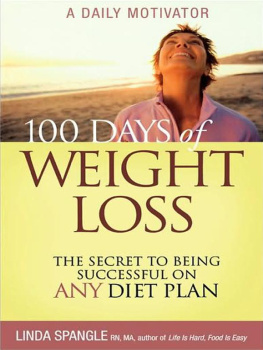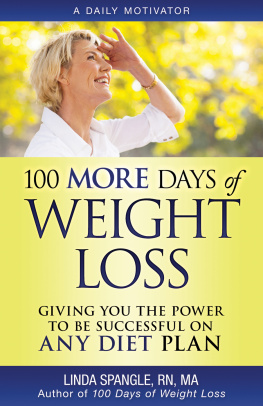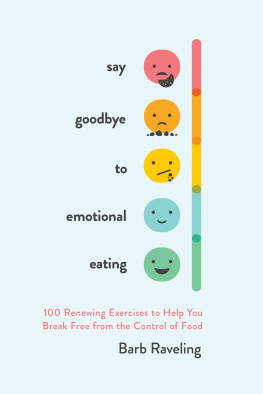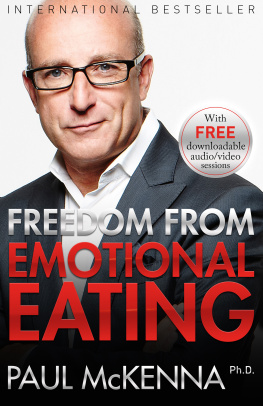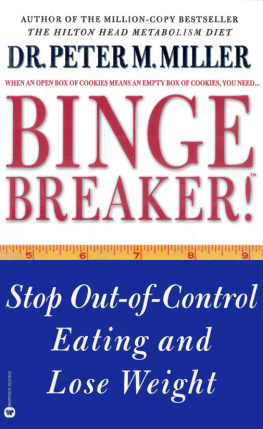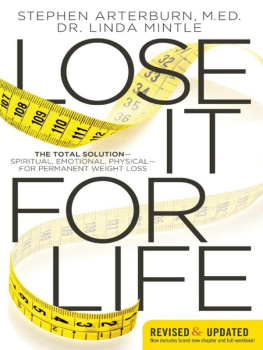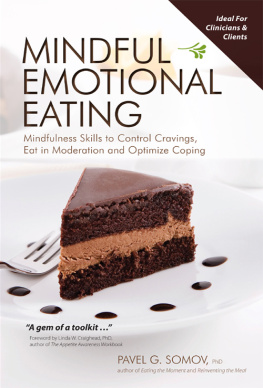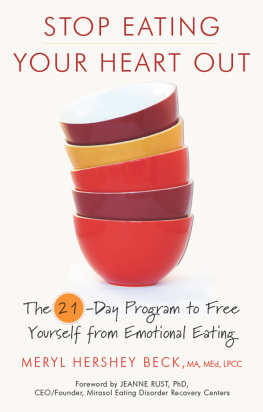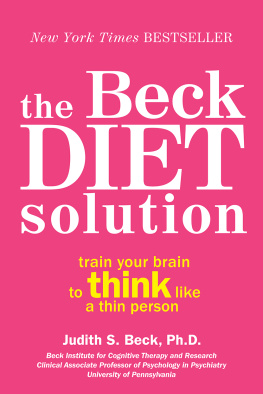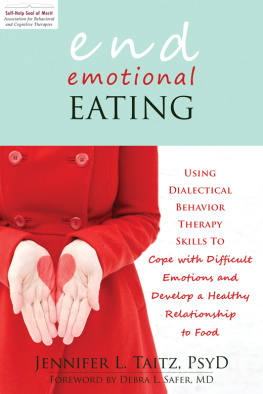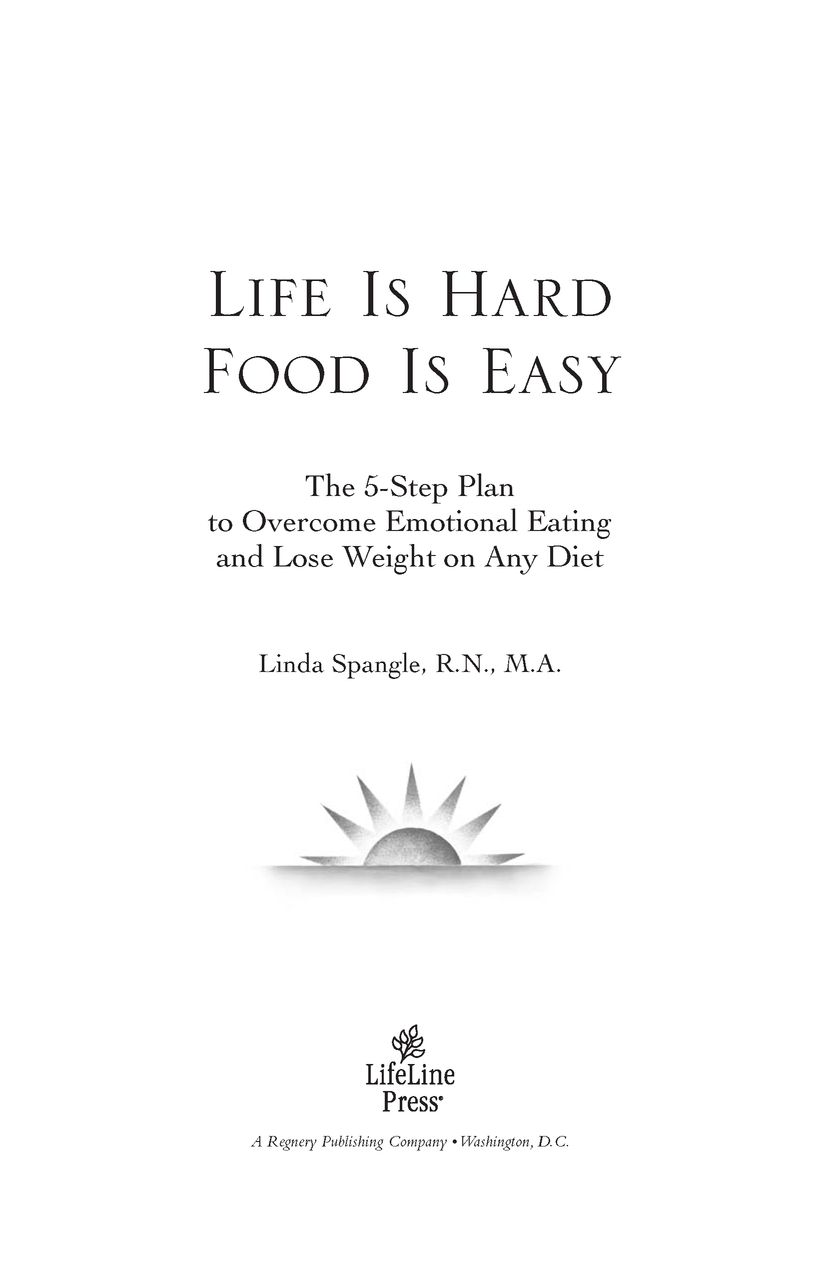Table of Contents
To my loving husband, Mike Spangle, for always seeing my potential instead of my struggles.
Foreword
IN THE FIELD OF WEIGHT MANAGEMENT, one of the biggest struggles is keeping people dedicated not only to losing weight, but also to changing their lifestyle and behaviors to make a lasting difference. This book identifies many of the reasons why people struggle to make their diet plans work. Linda Spangle helps you appreciate that perhaps its not the diet that failed you; maybe its you that failed the diet.
As the president and CEO of Medifast, Inc., I have seen firsthand the difference Linda has made in peoples lives. Since the early nineties, the Medifast weight-loss program has been used by more than 700,000 people and recommended by more than 15,000 medical practitioners. During her many years of working with Medifast, Linda Spangle has been one of the most successful clinicians in our network, mostly due to her emphasis on the emotional aspects of eating and dieting.
In her clinic, Linda developed and taught a dynamic model for behavior modification that increased her success rates dramatically. Lindas methodology along with her clinical expertise in the areas of weight management, behavior change, and emotional eating has given many of her patients new hope for long-term success.
Life Is Hard, Food Is Easy will help you understand the psychological reasons for emotional eating and teach you how to conquer old habits that get in the way of your progress. As you become more aware of how life issues affect the way you feel and even what you eat, youll be able to learn how to overcome these challenges and build a plan that brings lasting success.
Bradley T. MacDonald
Chief Executive Officer
Medifast, Inc.
Acknowledgments
ALONG THE JOURNEY OF WRITING THIS BOOK, Ive been blessed to have the support and guidance of so many people. Thanks to my publishing team at LifeLine Press, especially Mike Ward, for believing in this project and also for helping create the book title. Special thanks to my editor and friend, Molly Mullen, for your solid work as well as your ongoing encouragement.
Thanks to my feedback team, especially family therapist Lavonne Johnson, who provided valuable insight and information on the psychological issues. Id also like to thank my friend and editor, Barbara McNichol, who always took my perfect work and made it so much better.
Special thanks to Medifast Inc. CEO, Colonel Brad McDonald, a true pioneer in the field of obesity treatment. For many years, your support of my WINNERS clinic and my research with overweight individuals has given my work depth and helped me serve this population better. Thanks to the entire staff at Medifast for your kindness and support, and to the medical director, Dr. Wayne Andersen, for your passion to help people become healthier.
Id like to thank my mentor and friend, Jack Canfield, and the Self-Esteem Seminar training group. You helped me dig deeper than I knew was possible, giving me valuable skills for coaching others in their personal growth.
I wish to thank all the clients who taught me about the pain, the learning, and the joy of weight-loss success. Special thanks to Mary Jane Medlock, my coaching client who lost well over 100 pounds and has successfully maintained her weight. Thanks for openly sharing your stories and your heart as we learned together. I greatly appreciate all of the people whose experiences contributed to this book and the ways each of you helped me become a stronger support for individuals who struggle with emotional eating.
Finally, Id like to thank my husband, Mike Spangle, for constantly reminding me that Im a great writer, even during times when I dont believe it myself. You are always there for me, encouraging me on the good days and helping me cry on the bad ones. Your consistent love and support have been critical to my success with this book as well as my writing and teaching career. I also thank God for giving me the gift of writing and for teaching me how to help others heal the pain in their lives.
Introduction
ON THE WAY HOME FROM WORK, Kathy stopped to visit her mother. Shed planned to stay only a few minutes, but then she noticed the plate of freshly baked chocolate chip cookies. They smelled wonderful! Ill have just one, she thought. And she did. It tasted so good that soon she reached for another, then several more.
Suddenly she caught herself. What am I doing? she thought. Get those away from me! But it was too late. Once more, she had slipped off her diet and consumed her entire days worth of calories in one sitting.
Does this sound familiar? Do you ever follow your diet plan all day, then when evening comes, eat everything in sight? Are there days when you eat a lot of food but dont know why? What makes your dieting resolve disappear so quickly around a box of doughnuts or the restaurant dessert tray?
Think about all the reasons why you might eat something. Because Im hungry will probably show up on the list. But what about all the times you reach for food when you
arent hungry or physically needing nourishment? See if youve recently used any of these excuses:
I just wanted something to eat.
It looked good, so I ate it.
Mom made it especially for me.
I paid for that food and I want to get my moneys worth.
I was taught to clean my plate.
I love to eat and that food was my favorite.
Most of us would admit we sometimes reach for food when hunger has nothing to do with it. If you occasionally give in to an afternoon candy bar or take a second helping of lasagna, you probably wont cause much damage. But if youre trying to lose or maintain your weight, non-hungry eating has the potential to sabotage everything youve worked for.
Using food to appease an emotional or psychological need can easily become a habit. Without realizing it, you slide into the habit of using food to fix every emotion from anger and stress to depression and boredom. Over time, your eating plan becomes ineffective, your self-esteem drops, and your weight keeps going up.
I dont believe you need a stricter diet plan to protect you from doughnuts or chocolate chip cookies. You wont conquer emotional eating by avoiding food. Instead, you need to tackle the source of the problem and begin to understand why you so easily reach for food when you arent hungry.
For me, learning this principle didnt come easily! When I opened my wellness clinic in 1989, I assumed that the principles of healthy nutrition, regular exercise, and behavior modification would solve most peoples problems with being overweight.
But even with my diligent teaching, many of my clients would repeatedly lose weight, then gain it back. I experimented with new techniques, shifting the emphasis from dieting to never diet again. I advocated throwing away the scale.
For a while, I recommended the governments food pyramid (eat bread), then I switched to a high-protein plan (dont eat bread). My clients drank liquid supplements and swallowed pills. Of course, all of these methods worked for a while. But invariably many of my clients returned, frustrated with having regained weight theyd worked so hard to lose.
My personal success wasnt much better. Like many of you, Ive lost over 100 poundsby dropping the same fifteen to twenty pounds again and again. For many years, I kept trying different diet plans, typically losing weight but eventually experiencing the same frustrating re-gain.


